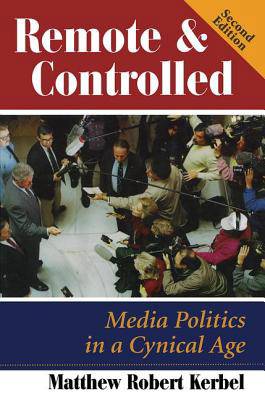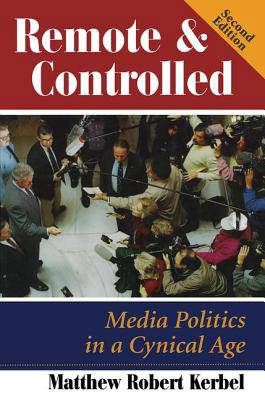
Je cadeautjes zeker op tijd in huis hebben voor de feestdagen? Kom langs in onze winkels en vind het perfecte geschenk!
- Afhalen na 1 uur in een winkel met voorraad
- Gratis thuislevering in België vanaf € 30
- Ruim aanbod met 7 miljoen producten
Je cadeautjes zeker op tijd in huis hebben voor de feestdagen? Kom langs in onze winkels en vind het perfecte geschenk!
- Afhalen na 1 uur in een winkel met voorraad
- Gratis thuislevering in België vanaf € 30
- Ruim aanbod met 7 miljoen producten
Zoeken
€ 83,95
+ 167 punten
Uitvoering
Omschrijving
Remote and Controlled examines the issue of widespread cynicism in an era of abundant information, asking whether it is possible to consume a steady diet of mainstream media and still understand and respect the political process. Starting with central examples of television's political coverage and the media's focus on the president, the author explores a variety of media--from newspapers and radio to MTV and computer networks--and political events and institutions. Against a historical backdrop of political, technological, and institutional change, the text raises critical questions for a society plugged into Rush, Oprah, and USA Today: How do the media both magnify and undermine the president? Can televised town meetings replace the real thing? How do politicians seek to control the flow of information, and what do the media do about it? Does the information explosion provide greater diversity or simply greater convenience? The second edition of this acclaimed text has been revised and updated to examine media coverage of recent events such as the Monica Lewinsky scandal. In the process, the author sheds light on the ultimate dilemma of whether an informed public will participate in a system in which campaigns are portrayed as if they were war, policymaking is depicted as if it were a campaign, and none of the participants--reporters included--appear particularly noble or worthy.
Specificaties
Betrokkenen
- Auteur(s):
- Uitgeverij:
Inhoud
- Aantal bladzijden:
- 190
- Taal:
- Engels
- Reeks:
Eigenschappen
- Productcode (EAN):
- 9780813368696
- Verschijningsdatum:
- 4/12/1998
- Uitvoering:
- Paperback
- Formaat:
- Trade paperback (VS)
- Afmetingen:
- 152 mm x 229 mm
- Gewicht:
- 290 g

Alleen bij Standaard Boekhandel
+ 167 punten op je klantenkaart van Standaard Boekhandel
Beoordelingen
We publiceren alleen reviews die voldoen aan de voorwaarden voor reviews. Bekijk onze voorwaarden voor reviews.









